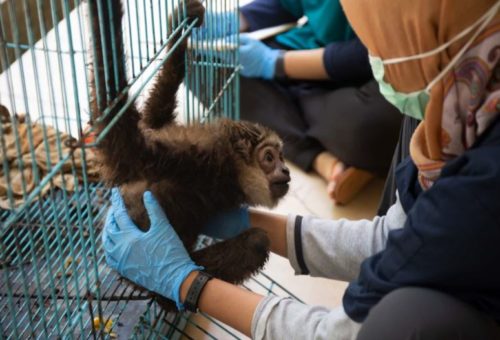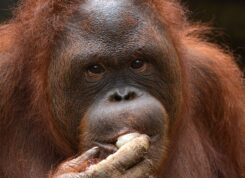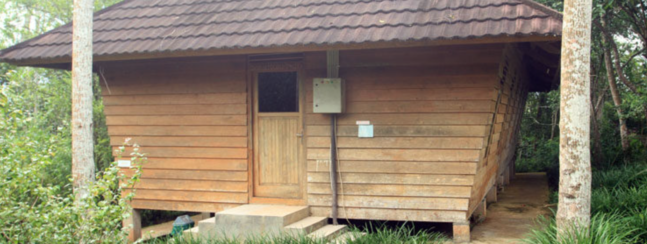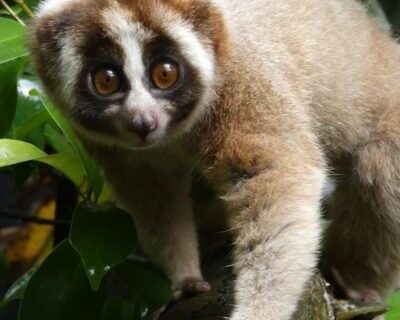Wildlife rescue volunteering in the amazing heart of Indonesia!
 Get involved in Wildlife Rescue Volunteering. You’ll be helping our friends and neighbours in Indonesia. Moreover, you will contribute to vital work in caring for rescued animals and using enrichment to improve their lives.
Get involved in Wildlife Rescue Volunteering. You’ll be helping our friends and neighbours in Indonesia. Moreover, you will contribute to vital work in caring for rescued animals and using enrichment to improve their lives.
The decline of Indonesia’s rainforests is resulting in reducing numbers of orangutans and other endangered species. Often, young animals are captured from the wild and sold illegally, to be kept as pets in cramped cages. This is where the rescue centre comes in.
Help with Animal Care and Enrichment
The centre accepts and cares for animals rescued from illegal ownership. If possible, it rehabilitates and releases them back into the wild. Sadly, many animals cannot be released due to behavioural or health conditions caused by their previous owner. So the centre becomes their permanent home. Our wildlife rescue volunteering opportunities allow you to get close to the animals and help improve their welfare.For instance, by creating and implementing enrichment activities. This centre is very well-established and has operated for over 20 years. Importantly, it employs more than 30 staff from the adjoining village. Moreover, it meets our standards for Ethical Animal Volunteering.
VOLUNTEER ACTIVITIES:
♥ CARE FOR RESCUED ANIMALS
♥ FROM ORANGUTANS & GIBBONS TO BIRDS & REPTILES
♥ LEARN ABOUT ANIMAL WELFARE
♥ REHABILITATION AND RELEASE
From £ 395 or € 450*
for 2 weeks
• INCLUDES ACCOMMODATION, MEALS AND ALL ACTIVITIES with Staff Supervision.
• MINIMUM AGE: 18 and above
• DURATION: min. 2 weeks
• OPERATION: All year round
“My experience at the Rescue Centre was life changing.” Sam Hunt, U.K.
Shadow an Animal Keeper
Working with different animals and keepers each day, you will be exposed to the full spectrum of wildlife at the centre. You will participate in food preparation and feeding, enclosure cleaning and animal enrichment activities and also spend some time at the vet clinic – a fantastic opportunity to observe, learn about the animals and ask questions! You will also participate in structured animal observation and possibly in building or developing the enclosures, if the need arises.
Animal Enrichment
Preparing enrichment items and activities is an important part of the volunteer work. Crucially, enrichments suited to the different species will allow the animals to maintain both their physical and mental health. They provide the necessary stimulation to the captive animals. Also, enrichment can help to teach natural skills that may have been lost due to their capture from the wild.

Work Schedule
Together with the Indonesian staff, your work schedule will be for 6 days, Monday to Saturday. You will start at 7 am and finish by 4 pm. A long lunch break, from 11.30 to 1 pm is included to allow you to recover from working in the tropical heat of the jungle.
Of course, there is also time for leisure on your days off. Visit the local bat caves or admire the beautiful waterfalls. There is also a chance to go shopping in the nearest town Sukabumi.
.

Be an ethical and informed animal volunteer
The health and safety of the animals, staff and volunteers are our priority and we take this very seriously. You will be provided with ample guidance and expected to adhere to this:
- The centre operates a strict ‘no contact’ policy. This is not only to prevent the spread of zoonotic disease ( such as COVID) but also to allow the animals to display natural behaviour and mingle with their own kind.
- There are proper health and safety practices. For instance, always wash your hands before and after preparing food, cleaning enclosures or having breaks. If you are unwell, then please advise the staff or volunteer coordinator as soon as you can, for your own protection and for the animals.
- Be alert and always aware of your surroundings. In practice, this means no headphones or music when working around the animals. Don’t leave items lying around or within easy reach such as tools, hoses, even jewellery that can be grabbed. Long hair should be tied up.
- Never tease or provoke an animal. In particular, primates can be agitated by unusual behaviour. Often they may try to grab you when you walk past, so never turn your back and be careful when moving around.
HOW TO BOOK


PRICING FOR INTERNATIONAL VOLUNTEERS
Equivalent to:
€440*
$475*
Equivalent to:
€605*
$645*
Equivalent to:
€780*
$840*
Includes:
- All project activities
- Dormitory style accommodation
- Lunch and dinner
- Drinks ( water, coffee, tea)
- Laundry service
Excludes:
- Transfer to/from airport to project NOT included
- We can arrange a taxi for an extra fee
- International flight fares
- Travel insurance and Visa costs
- Food/activities not included in the project
HOW TO BOOK

Accommodation
You will sleep at one of the single-sex ( male and female) dormitories at the centre. These have bunkbeds. Pillows and blankets are provided. The showers are Indonesian style which is more or less a cold water bucket. Luckily, the tropical temperature allows for the water to be luke-warm most of the time! A laundry service is provided. Also, the volunteer areas will be cleaned on a daily basis.
There is a beautiful communal space for the volunteers with a view of the rice fields. It serves as a canteen and has hammocks and games (darts, cards).


Food
The food served is local Indonesian food ( so-called Sunda style) for lunch and dinner. We can cater for vegetarians, vegans and special dietary needs, if you request in advance.
Volunteers are expected to arrange for their own breakfast. The centre offers weekly shopping trips to the local town of Sukabumi where you can purchase snacks and other items.
HOW TO BOOK

Cikananga’s long-term role
Cikananga Wildlife Center (CWC) or Pusat Penyelamatan Satwa Cikananga (PPSC) fulfills a critical role in protecting Indonesian wildlife. It accepts and houses wild animals that have nowhere else to go. Essentially, these animals have been rescued from the illegal wildlife trade and cannot be released back into their natural environment. This can be due to many reasons. Usually, the animals are in a very poor physical and mental state when they arrive and are in need of medical care. Sometimes, after a long process of rehabilitation, it is possible to transfer such animals back to their original habitat. These successes represent the fundamental mission of wildlife conservation: to protect wild species and boost their population, if possible.
Another way that CWC contributes to saving threatened animals is the Conservation Breeding Center (CCBC). For instance, its successful breeding program for the mythical Javan Green Magpie (Cissa thalissina). This species conservation program is in cooperation with Chester Zoo and Manchester Metropolitan University. Ultimately, the aim is to not only provide a safe haven for the released birds, but also alternative income streams for forest communities that trap the green magpies.
Finally, the centre also acts as a Wildlife Learning Center. It assists the government in educating the general public about the value and correct care of wild animals. CWC could not carry out its important conservation work without generous support from donors, especially the Wanicare Foundation. Since 2009, this non-profit organisation based in the Netherlands has been fundraising and supporting Cikananga in its daily management and animal care.


Success stories to date:
Since its beginning in 2001, Cikananga has achieved a lot. These are just some highlights:
- The centre has received 26 infants, juveniles, and sub-adults of Indonesia’s most iconic species; the Orangutan. Fantastically, 24 individuals were returned to their original home in Kalimantan or Sumatra for rehabilitation. Only 2 individuals, Noni and Dodo, remain at Cikananga until a sanctuary place opens up in their native land.
- Many bird species have arrived at the centre. In particular, 248 eagles of 14 different species were all rescued from illegal trade and ownership. These birds were all rehabilitated, released and carefully monitored in the wild.
- Another threatened local species that is commonly rescued in large confiscations is the Slow Loris. Sometimes the centre has to accept many at short notice and prepare enclosures within 24 hours. For example, in 2013, 80 individuals arrived from one rescue operation. Sadly, a lot of these animals, taken from the wild, were in very poor health and needed medical attention. Some of them died, but Cikananga managed to translocate 14 to Internaitonal Animal Rescue (IAR) for release in Sumatra. Currently, they are still taking care of 10 Sumatran slow loris that are not fit for release due to injuries sustained during capture and transport.
- The centre has long-term goals for sustainability. Over the years, it has developed facilities for a composting system on site. Today, all organic waste produced by the animals along with their food waste is taken to the composting building three times a week. Once complete, the compost is bagged and transported to Cikananga’s organic farm where it is incorporated into the soil providing necessary nutrients for our food program.
HOW TO BOOK

Requirements
What are the requirements to join this programme?
Volunteers will need to be able to speak English or Bahasa Indonesia to be able to communicate with the staff/facilitator. The minimum age for the project is 18 years old.
Do I need any previous wildlife experience/knowledge?
No experience is necessary, just an enthusiasm for wildlife and caring for them. Our friendly staff will teach you everything you need to know about wildlife care!
Who can join the project?
We require our volunteers to be 18 years old and above.
Project Information
What is the mission and vision of the project?
The project accepts and cares for rescued animals confiscated from illegal ownership under the Protected Wildlife Law. Whenever possible, the centre aims to rehabilitate and release the rescued animals. Unfortunately, Cikananga also serves as a permanent refuge for animals who cannot be returned to the wild due to health or behavioural conditions.
What is a typical day at the project like?
Volunteers will start working at 7.00 am and finish by 4 pm. A long lunch break, from 11.30 to 1 pm is included to allow you to recover from working in the tropical heat of the jungle. Together with the Indonesian staff, your work schedule will be for 6 days, Monday to Saturday. Of course, there is also time for leisure on your days off. Visit the local bat caves or admire the beautiful waterfalls. There is also a chance to go shopping in the nearest town Sukabumi.
Is there a sample itinerary?
Here is a list of volunteering activities you will be doing throughout your stay with the project:
- Shadow an animal keeper helping clean enclosures, prepare food and help with feeding
- Create and maintain enrichment activities for the animals
- Visit animal release sights and learn all about the centre’s rehabilitation programmes
- Enjoy the taste of Indonesia with a traditional Sunda-style dinner
Insurance, Visa and Vaccinations
Do I need insurance?
We highly recommend travel insurance to safeguard against sickness, loss of money, flight delay/cancellation or lost baggage.
Feel free to message us for further advice.
Do I need visa?
Indonesia has strict visa requirements, so it’s worth checking with your local Indonesian Embassy or consulate. For most nationalities, a 60-day visa (B112A) is required at a cost of €150 or IDR 1,500,000. All visa applications are handled by the wildlife center, as they act as the visa sponsor.
Do I need vaccinations?
Due to the nature of the work, volunteers are required to be vaccinated against COVID, Tuberculosis, Hepatitis A, B and C.
Project services
Is there internet access?
WiFi is available at the accommodation.
Are there ATMs nearby?
There is an ATM in the nearest large town, Sukabumi which you can visit on a weekly basis.
What should I bring with me?
Volunteers can refer to the project’s volunteer guide which includes a list of inventory that they should bring. This will be given upon booking with us.
Will I get support and guidance during my stay?
Of course! We are very proud of our friendly and talented team, who are happy to help throughout your stay. All of the project staff have amazing local knowledge and skill-sets, making them the perfect leaders and teachers.
Any further queries you have before booking can be resolved by contacting us directly.
Travel arrangement
How do I get to Cikananga from Jakarta International Airport?
We can arrange a special transfer by taxi. Volunteers can be picked up from the airport and taken to the project site. Please ask us for more details at the time of booking.
Other Information
I have some specific questions about the project.
We are always happy to help you with any enquiries. Feel free to contact us.
